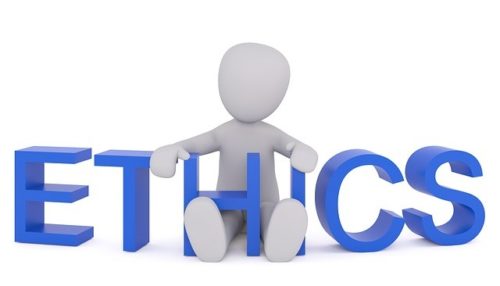- Introduction to business fundraising
- Types of capital and sources
- Introduction to Private Placements
- Discussion of new crowdfunding regulations
- Valuation considerations
- Creating a great pitch deck
-
A Lawyer's Guide to Raising Capital In this timely, and compelling, CLE program attorney, Todd Kulkin, presents “A Lawyer’s Guide to Raising Capital”. The program begins with an overview of business fundraising and the types of capital and sources. The program continues with an introduction to private placements. Mr. Kulkin then provides a discussion of new crowdfunding regulations and valuation considerations. The program concludes with how to create a great pitch deck. This program is for any attorney who needs to raise capital or or has clients who need to raise capital. Agenda:
-
A Lawyer’s Guide to Ethics and Ethical Networking in a Virtual World As an attorney, you are in the business of relationships. Whether you are in a big law firm that has to participate in “Beauty Contests” (RFPs) or a solo practitioner, whether you are a new attorney, a mid-level associate or managing partner, people do business with People “they know, like and trust.” The relationships you create will allow you to build the practice you want and networking is still the best way to create those relationships. You will specifically learn: How to define networking in new way Why networking is the best way to become a Rainmaker What skills you can learn networking that will benefit every area of your practice Where to network for the best results How to work a room Fun tips and tricks to use to break the ice How to network if you are an introvert An overview of how use social media for networking purposes The Rules of Professional Conduct you need to know to keep your networking ethical as well as interesting
-
In this timely, and compelling, CLE program, attorney Michael J. Deblis Presents, “Anatomy of a Civil Tax Controversy” Join attorney Deblis as he walks you through the anatomy of a civil tax controversy from A through Z. This program will cover each step in the process, and will take a closer look at what to do during an eggshell audit. Other topics to be discussed include cases typically recommended for prosecution, attorney-client privilege in the tax realm, Kovel Agreements, IRS Appeals, and more. This program is a must for any attorney Learning Objectives In-depth overview of the anatomy of a civil tax controversy from A through Z Best practices for walking your client through an eggshell audit A Review attorney-client privilege in the tax realm Discuss the use of a Kovel Accountant and drafting an airtight Kovel Agreement A Comprehension of the IRS Appeals Process Evaluate the hazards of litigation
-
In this timely, and compelling, CLE program attorney, Todd Kulkin, presents “Anti Money Laundering for Business Lawyers”. The program begins with an overview of money laundering basics and why attorneys should care about money laundering. The program continues with an in-depth look at statues and regulations. Mr. Kulkin then provides an explanation of shell corporations, special purpose entities, and how to mitigate your risk. The program concludes with an AML transaction checklist discussion. This program is for any attorney who’s in business or has clients in business. Agenda:
- Money Laundering Basics
- Why Care about AML?
- Statutes & Regulations
- Shell Corporations vs Special Purpose Entities
- Know Your Customer (“KYC”) considerations
- Mitigating Your Risk
- AML Transactional Checklist
-
Arizona Bundle 15 Credits including 3 Ethics and Professional Credits
Bundle Courses:
Lemon Law (1 Credit) Intervention Strategies for Helping the Legal Professional (1 Ethics Credit) Everything You Want to Know About Distressed Lawyers (1 Ethics Credit) Civil Settlement Techniques (1.5 Credits) Malpractice Actions: Elements and Defenses (1.5 Credits) Ethical Obligations for Clients with Mental Health Impairments (1 Ethics Credit)Navigating Stormy Parenting Plans - Process Over Chaos (1 Credit)
Estates for Personal Injury Litigators (1 Credit)
Religious Land Use and Institutionalized Persons Act (2 Credits) Virtual Isolation: Is Hyperconnectivity Helping or Harming the Legal Professional? (1 Credit) Microsoft Office 365 For Attorneys (1 Credit) Anatomy of a Civil Tax Controversy (1.5 Credits) The Healthcare Quality Improvement Act: How to Achieve Immunity in Your Peer Review Process (1 Credit) The State Bar of Arizona does not approve or accredit CLE activities for the Mandatory Continuing Legal Education requirement. This activity may qualify for up to 15 hours toward your annual CLE requirement for the State Bar of Arizona, including 3 hour(s) of professional responsibility. -
Athlete Agency Law: Keeping Athletes & Agents on the Field and Out of Jail In this timely and compelling CLE program Attorney and author, Brian Brunkow, presents “Athlete Agency Law: Keeping Athletes and Agents on the Field and Out of Jail”. Mr. Brunkow begins the program with an introduction of agency regulations and agent selection. The program continues with an explanation of a lawyer’s role with regard to representation of an athlete. Attorney Brunkow also covers how an athlete stays compliant with the regulations. The program then goes into an in depth explanation of the applicable regulations and contract issues. This program is a must for any attorney. Agenda:
- Athlete Agency Regs
- Agent Selection
- Lawyer Role
- Athletic Compliance
- Recruit & Pro
- Agent
- Contracts
- Universe of Regulations
- Federal FTC (SPARTA)
- States (UAAA/NON)
- Universities
- Pros
-
Attorney Licensure and the Impaired Professional
-
Attorney’s Guide to Online Defamation & Website Removal This program, presented by internet defamation attorney and published author Paul Sternberg, will provide an overview of what constitutes online defamation. Mr. Sternberg will discuss in detail the complex web of laws governing defamatory statements including the First Amendment, the Communications Decency Act, the Digital Millennium Copyright Act, recent case law, and more. Other topics to be discussed include the difference between libel and slander and considerations for determining if and when to file suit for defamatory conduct. The mechanics of a defamation suit will then be explored in great detail, including a review of cease and desist letters, anti-SLAPP laws, discovery exceptions, and much more.
- The First Amendment and Protected Speech
- Determining the Defaming Party
- Understanding Liability Under the CDA and the DMCA
- Legal Strategies to Consider in Defamation Cases
- Building a Defamation Case or Defense and Removing a Website
- Libel vs. Slander
- Weighing the Decision to Sue
- Deploying a Cease and Desist Letter
- SLAPP and ANTI-SLAPP Laws
- The Streisand Effect
- Elements to Prove
- Statutes of Limitation
-
Avoiding #MeToo and Sexual Harassment in the Workplace
-
Avoiding the $1.5 Billion Mistake: Article 9 Lessons Learned from the GM Bankruptcy In this compelling and timely CLE program Attorney, Donald Petersen, covers Article 9 implications. Mr. Petersen will discuss the importance of Article 9 and how it works. Mr. Petersen will cover, systemically, his own steps to success with regards to Article 9 issues. This program is a must listen for any attorney wishing to learn more about Article 9 AGENDA: What is Secured Transactions? UCC and Article 9 Introduction Article 9 UCC Article 9 Steps to Success Proceeds Analysis PMSI Disbursing Cash Proceeds
-
Banking for the Non-Banking Attorney In this timely and compelling CLE program, attorney, Kathleen A. Scott presents “Banking for the Non-Banking Attorney”. Attorney Scott starts the program with an introduction to banking regulators and powers. The program continues with an overview of capital requirements and transaction-related issues. Ms. Scott also explains anti-money laundering and economic sanctions. The program concludes with a discussion of other regulatory issues. This program is a must for any attorney. Agenda:
- Principal banking statutes
- Banking regulators
- Basic banking powers
- Capital requirements
- Transaction-related issues
- Anti-money laundering
- Economic sanctions
- Other regulatory issues
-
Basic Considerations in Assessment of an Oil and Gas Lease
-
Basics of Landlord/Tenant Law for Ohio
Discover the essentials of landlord/tenant law in Ohio with this concise course. Whether you're a landlord or tenant, gain insights into key topics such as lease agreements, security deposits, eviction procedures, and property maintenance. Learn about your rights and responsibilities under Ohio law to establish fair and harmonious rental relationships. Please note that this course provides an overview and should not be considered legal advice. Consult an attorney for specific cases or unique circumstances. Start your journey towards understanding Ohio's landlord/tenant law today!
Agenda:
-
Overview of Landlord/Tenant Law
-
Define landlord/tenant law
-
Discuss the importance of understanding the legal framework
-
-
Lease Agreements
-
Explain the key elements of a lease agreement
-
Discuss common terms and provisions
-
Highlight the significance of written agreements
-
-
Security Deposits
-
Describe the purpose and regulations surrounding security deposits
-
Explain procedures for handling and refunding deposits
-
Discuss legal requirements for documenting damages
-
-
Rent Increases
-
Explain the rules and limitations on rent increases in Ohio
-
Discuss proper notice requirements
-
-
Eviction Procedures
-
Outline the steps involved in evicting a tenant
-
Explain the legal grounds for eviction
-
Discuss the importance of adhering to proper procedures
-
-
Property Maintenance
-
Discuss landlord responsibilities for maintaining the rental property
-
Highlight tenants' rights to habitable living conditions
-
Address common maintenance issues and dispute resolution
-
-
Tenant Rights
-
Explain tenants' rights under Ohio's fair housing laws
-
Discuss protections against wrongful eviction and discrimination
-
Briefly cover privacy rights and access to the property
-
-
-
Benefiting from New Markets Tax Credits In this timely and compelling CLE program, attorneys, Julia Fendler and Trey Parker present “New Market Tax Credits”. The New Markets Tax Credit (“NMTC”) Program is administered by the Community Development Financial Institutions Fund (the “CDFI Fund”) of the United States Department of the Treasury. The NMTC Program is a federal statutory program, created in 2000 and currently extended through 2025, that is designed to encourage capital investment in low-income communities that have had inadequate access to capital. It is codified in Section 45D of the Internal Revenue Code. This program is for any attorney. Agenda:
- Program Basics
- Major Players and Definitions
- Application and high level NMTC allocation facts
- What can NMTC proceeds be used for?
- Project Requirements
- Secondary criteria
- Typical Transactions
- What Other subsidies work with NMTCs?
- Conclusion
-
Borderline Personality Disorder: Pre-Plea and Pre-Sentence Criminal Mitigation Strategies
Course Description
In this timely and compelling CLE program, attorney and forensic expert Mark Silver presents “Border Personality Disorder: Pre-Plea and Pre-Sentencing Criminal Mitigation Strategies”. Borderline Personality Disorder is among the most important mental health issues for lawyers. As many as 6% of the population carry the diagnosis of Borderline Personality Disorder. It’s important for the criminal defense lawyer to be able to recognize borderline personality disorder in clients and know when to refer the case for an evaluation and how to use aspects of this disorder for mitigation purposes. This program is a must for any attorney. Learning Objectives/Agenda:- Recognize the criteria of Borderline Personality Disorder as among the most important mental health diagnoses with criminal defendants
- Identify the challenges and obstacles of defending such clients
- Examine how the criteria of this disorder can serve as a direct defense and/or mitigating factors in the advocacy process
-
California 25 Credit Bundle with Ethics, Bias, Tech, Civility, and Substance Abuse All Courses are approved by The State Bar of California All Credits are Participatory Credits
-
Cannabis Law
In this timely and compelling CLE program, Attorney, Hanan Kolko presents Cannabis Law. Mr. Kolko starts the program with a discussion of the Federal Law with a focus on the Cole Memo. The program continues with an in depth explanation of case law, preemption, and the illegality defense. The program continues with an overview of recent ethical developments for lawyers with an emphasis on relevant ABA model rules. Mr. Kolko then presents different state ethical approaches and provides an ethical analysis between state and federal governments. The program concludes with an inquiry of other federal law on cannabis business and bankruptcy with regards to cannabis. This program is a must for any attorney. -
Civility and Professionalism: The Art of Graceful Disagreement The effectiveness of our adversarial legal system is greatly enhanced through the combination of talent and temperament. The mark of a fine lawyer is the ability to gain both reverence and respect through effective advocacy combined with civility and fair play. This combination decreases animosity from the conference room to the courtroom, promotes good faith negotiation, and will ultimately both benefit clients and improve the public perception of the profession. This course will provide a thorough examination of a lawyer’s ethical and professional duties both in and out of the courtroom as they relate to civility and professionalism. It will discuss the interaction between advocacy and civility using practical examples frequently faced by practitioners of every type, and provide recent case law and ethical rules discussing some common issues. It will cover applicable rules of both ethics and professionalism, as well as the duty of respect to the court and the court’s power of contempt.
-
Colorado 45 Credit Bundle with 7 Ethics Credits - All Courses Approved in Colorado! Bundle Courses Include: Information Law Firms Collect and Store – What to do in the Event of a Cyber Breach? (2 Credits) Opening Statement As a Story 101 - (1 Credit) Opening Statements As a Story - 102 (2 Credits) Closing Arguments (2 Credits) Elimination of Bias in the Legal Profession: Both Personally and Professionally (1 EDI Credit) Technology & Bias Spreading It And Stopping It (1 EDI Credit) Everything You Want to Know About Distressed Lawyers (1 Ethics Credit) Lemon Law (1 Credit) Ethical Issues - Pro Bono Representation: Help the Profession Help Others (1 Ethics Credit) Online Civility and Professionalism for Attorneys (1 Ethics Credit) Story Telling in the Courtroom Part 1 (2 Credits) Story Telling in the Courtroom Part 2 (2 Credits) Story Telling in the Courtroom Part 3 (1 Credit) The Fifth Amendment’s Essential Role in Offshore Audits (2 Credits) Digital Millennium Copyright Act (1 Credit) Immigration Basics: Coming to America and Staying (1 Credit) Shackled to Our Screens: How Technology Has Imprisoned the Legal Profession (1 Ethics Credit) Don't Give Up 5 Minutes Before the Miracle (1 Ethics Credit) Civil Settlement Techniques (2 Credits) Navigating Copyright Law for Creatives and Artists (2 Credits) Navigating Malpractice Critical Elements and Defenses (2 Credits)
When Good Enough Isn't Good Enough - Perfectionism in the Legal Profession (1 Credit)
Be It Resolved - Striving for a (Realistic) Work/Life Balance (1 Ethics Credit)
Welcome to the NFL, Rook! Lawyers Wrangling Elites & Egos (2 Credits) Virtual Isolation: Is Hyperconnectivity Helping or Harming the Legal Professional? (1 Ethics Credit)Navigating Stormy Parenting Plans - Process Over Chaos (1 Credit)
Estates for Personal Injury Litigators (1 Credit)
Religious Land Use and Institutionalized Persons Act (3 Credits) Ethical Obligations for Clients with Mental Health Impairments (1 Ethics Credit) Cross Examination Made Simple (2 Credits) Overview of the Freedom of Information Act (2 Credits) Paying for Referrals: A Danger to the Payor and Recipient's Freedom (1 Credit) Civil Tax Disputes (2 Credits) -
Complex Trauma in Criminal Mitigation Cases: How Abuse and Neglect Cause Abnormal Development
Many criminal defendants have suffered complex trauma that must be explicated through presentence reports by mitigation experts. This seminar will focus on major approaches to conceptualize the harm that many of our clients have suffered in childhood and a developmental perspective focusing on the effects of abuse and neglect. The seminar will also consider how these matters are assessed in a psychosocial evaluation and major psychopathology that results from complex trauma.
Learning Objectives:
- Identify the ACE criteria in the context of complex trauma.
- Understand a developmental perspective of abuse and neglect in the context of complex trauma.
- Understand how psychosocial evaluations by mitigation experts consider complex trauma.
- Understand the major areas of psychopathology that result from complex trauma.
-
Copyright for Artists In this timely and compelling CLE program, Attorney, Gale Elston presents Copyright for Artists. During this thorough and engaging program Attorney Eltson begins with an overview of intellectual property with regards to artists and the history of copyright. The program continues with a detailed discussion of relevant case law and statutes. Attorney Elston also covers fair use and it’s limitations. The program concludes with an explanation of the Visual Rights Act. This program is a must for any attorney. Agenda:
- Overview areas of Intellectual Property law
- History of Copyright
- Difference between published and unpublished work
- Case Law and Statutes
- Ideas vs. Expression
- Elements of Copyright Ability
- Concept of publication
- Exclusive Rights
- Fair Use
- Transfers, Procedure, Damages
- Visual Artist Rights Act
-
Coronavirus and Your Mental Health In this timely and compelling CLE program, Attorney, Brian Quinn presents, “Coronavirus and Your Mental Health: A Lawyer’s Guide to Coping with Isolation, Anxiety, and Fear in Uncertain Times”. Mr. Quinn begins the program with a discussion on mental health statistics and symptoms of depression and stress factors. The program continues with an overview of dealing with solitude, anxiety, and fear. Mr. Quinn then explains ethically challenges and some warning signs. The program concludes with challenges of seeking help and how lawyers can seek help. This program is for all attorneys. Agenda
- Mental Health Statistics
- Symptoms of Depression
- Stress Impact and Factors
- How to Distress
- Solitude and Loneliness
- Dealing with Anxiety
- Dealing with Fear
- Ethically Challenges
- Warning Signs
- Challenges with Seeking Help
- How to Seek Help
-
Covid-19: Business and Asset Protection A coronavirus-induced recession is no longer avoidable—it is happening right now. Each recession brings with it declining sales, job losses, falling rents, and defaults on loans and leases. When a crisis hits, getting a head start matters and those who have prepared will fare better than those who have not. This engaging presentation on protecting assets from plaintiffs, lenders, creditors and the government will cover lessons learned from the financial crisis of 2008 that we can apply to 2020, what businesses can do now to transition into the recession, and how companies and individuals can protect their assets from litigation and creditor threats. The instructor will share real-life stories and anecdotes, and will present a very practical approach to protecting assets. The discussion will also cover asset protection planning in a troubled economy, focusing on protecting assets from lenders and landlords and how to plan after a lawsuit, a default or an accident. Agenda:
- Debt Collection
- Fraudulent Transfers
- Entity Planning
- Choice of Entity
- Planning with Trusts
- Foregin Trusts
- Retirement Plans
- Examples
-
Criminal Mitigation: Pre-Plea and Pre-Sentencing Strategies
Course Description
In this timely and compelling CLE course, attorney and forensic psychologist Mark Silver, presents “Criminal Mitigation: Pre-Plea and Pre-Sentencing Strategies”. Mr. Silver starts the program with an overview of various humanizing processes that a criminal law attorney can utilize to better advocate for their client. Mr. Silver then discusses how the use of psychological analysis can have a more positive impact on a client and increase their chances of success. This program is a must for any attorney. Learning Objectives/Agenda:- Summarize the definition and applicability of mitigation to a defendant's case
- Identify the multi-purpose uses of mitigation in the course of defense
- Examine how criminal mitigation can best assist one's client
- Describe which clients most benefit from criminal mitigation and why
-
Cultural Competence: Recognizing Implicit Bias Successful legal practice requires positive working relationships within an environment of cooperation and respect. Professionalism prompts productivity, which creates profit. This program seeks to enhance your ability to achieve and maintain a thriving, productive, inclusive workplace of equal opportunity through a lively discussion of how to detect and address implicit bias, increase diversity, and enhance cultural competence. This program will focus on how to recognize implicit bias through some of the more common perceptible red flags flown by employees harboring biased views or discriminatory intent. By discussing what to look for, and where and when to look, this program will enhance the ability of managers and supervisors to spot problem employees sooner rather than later. Focusing on education and inclusion will reduce workplace harassment, bullying, and discrimination, boost morale, and help employers avoid legal liability. Addressing issues of implicit bias will help employers to maintain a workplace that is both culturally diverse and culturally sensitive, to promote a sense of inclusion and comfort for all employees.
-
Cyber Security for Lawyers and Law Firms In this timely and compelling CLE program, attorney, Russell Jackman presents: “Cyber Security for Lawyers and Law Firms.” Mr. Jackman introduces the program going over major concerns with cyber security and explains what malware and cyber attacks are. The program continues with a discussion of who the attackers are and how they attack a law firm or lawyer's computer. The program gives an in-depth explanation of how to protect yourself and your computer. This program is for any attorney with a computer. AGENDA
- Concerns with Cyber Security
- Malware and Cyber Attacks
- Who is attacking
- Ransomware
- Hijackers and Adware
- Virus, bugs, and worms
- Anti-Virus Software
- Firewalls
-
Dealing with the Disruptive Practitioner in a Legally Compliant Manner
-
Direct Examination: Making the Witness Look Good








